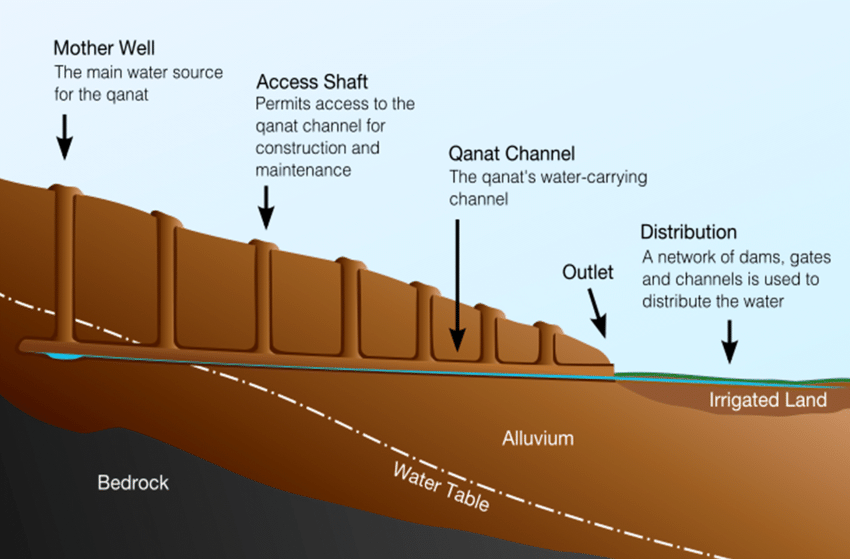An ancient system that could bring water to dry areas (DownToEarth)

- 18 Jan 2024
Why is it in the News?
Some of Africa’s dry areas face serious water shortages due to minimal rainfall. An ancient system of drawing water from aquifers, the “qanat system”, could help.
What is the Qanat system?
- The qanats have been used for centuries in arid and semi-arid parts of North Africa, the Middle East and Asia, where water supplies are limited.
- It’s known by a variety of names, “foggara” in North Africa, “falaj” in Oman and “qarez” in parts of Asia.
- It’s thought to have been developed in Persia in the first millennium BC.
- As the Islamic Empire spread across the Arabian Peninsula, the Levant, north Africa and parts of Europe from 661 to 750 CE, so did knowledge about qanats.
- Today, some of the region’s qanat systems, like those in Iran, are protected under heritage status.
- Some of these qanats, although declining in number, are still used.
- They are largely protected for historical and cultural reasons.
How does the qanat system work?
- There are bodies of water underground known as aquifers, some of which can be found at the tops of valleys or near mountains.
- A qanat system taps these aquifers and, using underground tunnels, moves the water, using gravity, over many kilometres.
- The tunnel then exits at a lower-lying area.
- When the water exits the tunnel, farmers can use it to irrigate their crops.
- People can also access the water along the stretch of the tunnel using wells.
- It’s a system that’s managed by everyone and its benefits are shared.
- Everybody has a vested interest and a role to play and community bonds can be strengthened.
Advantages of qanat systems:
- Efficient use of water: Qanats allow for the extraction and transport of groundwater from deep underground sources to the surface.
- This allows for a more efficient use of water resources, as the water is extracted and transported to the surface for irrigation and other purposes.
- Sustainable water supply: Qanats can provide a reliable and sustainable source of water for communities, even in arid regions where surface water is scarce.
- Cool and humid air supply: The cool and humid air that flows through the qanat can be used to provide a natural air conditioning system for buildings, as well as to irrigate crops and orchards.
- Low maintenance: Qanats require minimal maintenance once they are constructed, making them a cost-effective and long-lasting water supply solution.
- Disaster resilience: Qanats are resilient to natural disasters such as earthquakes and floods, as they are located underground and protected from damage.
